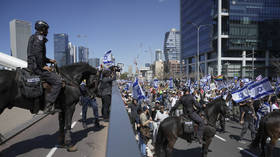Israel nearing civil war – president

Israeli President Isaac Herzog has warned that the Jewish state stands on the brink of civil war over proposed judicial reforms by the newly-elected government. Amid nationwide protests, he presented a set of alternate reforms, which have been rejected by Prime Minister Benjamin Netanyahu.
“Those who think that a real civil war, with human lives, is a border we won’t cross, have no idea,” Herzog said in a video address on Wednesday. “The abyss is within touching distance,” he continued, adding that “at any price, and by any means, I won’t let it happen.”
Israel has been rocked by continuous protests since Netanyahu announced his proposed reforms in January. These legal changes would allow Israel’s parliament to override Supreme Court rulings with a simple majority vote, would grant the government more power in appointing judges, and would limit the ability of the court to review legislation it deems “unreasonable.”
Parliament on Tuesday voted to advance a bill that would allow lawmakers to override rulings. The vote came after hundreds of thousands of demonstrators took to the streets of Tel Aviv, Jerusalem, Haifa, and other Israeli cities over the weekend to oppose its passage.
Herzog, whose role is largely a ceremonial one, responded by proposing an alternate package of reforms. Herzog’s plan would still forbid the court from reviewing legislation it considers “unreasonable” but would allow it to strike down parliamentary decisions with a two-thirds majority of justices. Among other compromises, it would also allow parliament to override rulings, but only with the agreement of at least one other branch of government.
Netanyahu rejected Herzog’s plan, telling reporters that it “would only perpetuate the existing situation.” His rejection triggered renewed protests on Wednesday evening, as demonstrators gathered at Ben Gurion Airport in Tel Aviv in a bid to disrupt a planned trip by the PM to Berlin.
Critics of the prime minister argue that the legal change would allow Netanyahu to rule as an authoritarian, and to pass legislation shielding him from ongoing corruption investigations. Herog sided with these critics last week, calling the reforms “oppressive” and anti-democratic.
In an appeal before Tuesday’s vote, he declared that the reforms had triggered a “constitutional and social crisis,” and should be abandoned before Israel suffers “diplomatic, economic, social and security repercussions.”













